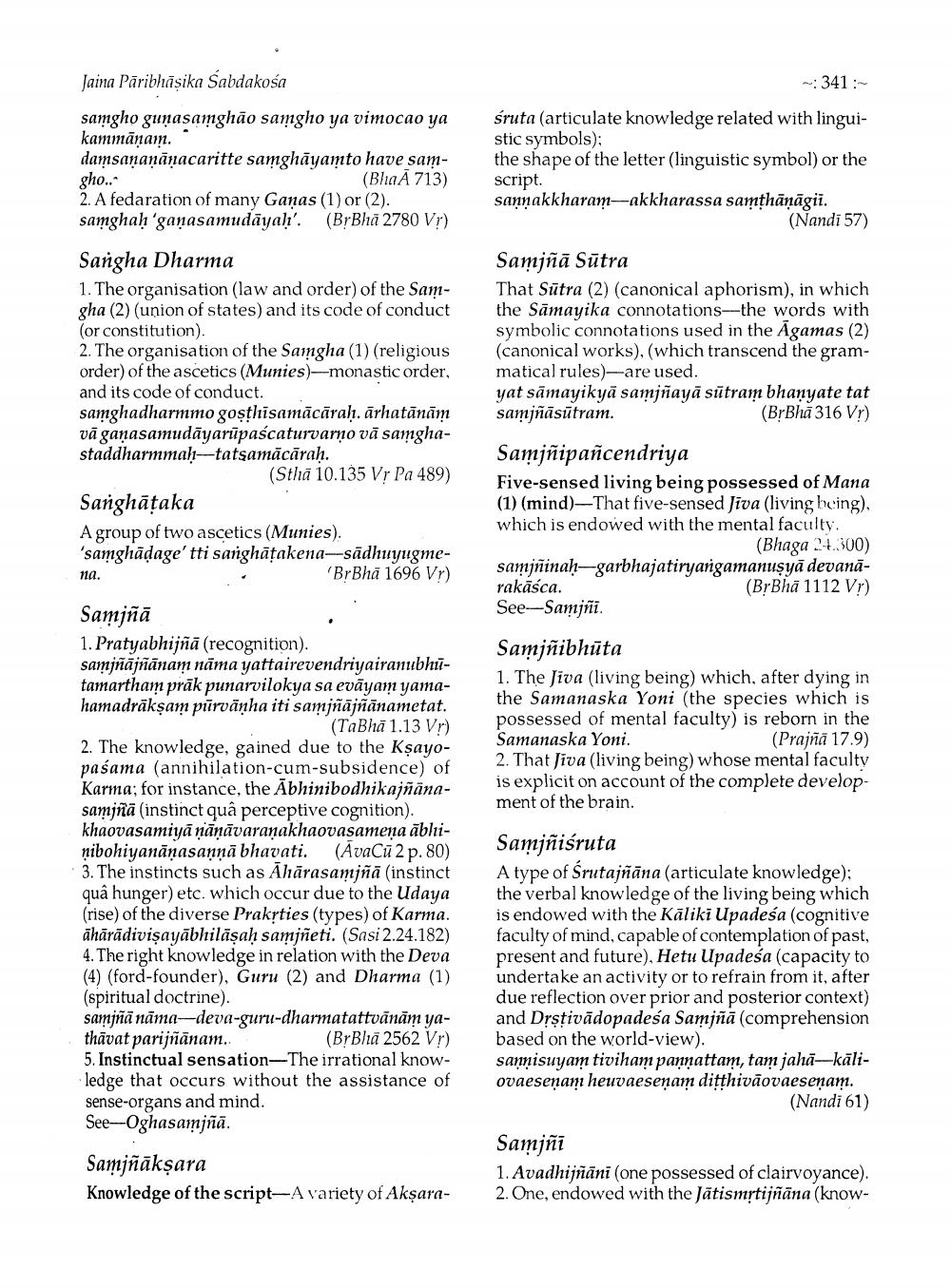________________
- 341:
Jaina Pāribhāṣika Sabdakosa samgho gunasamghāo samgho ya vimocao ya kammāņam. damsaņaņāņacaritte samghāyamto have samgho...
(BhaA 713) 2. A fedaration of many Ganas (1) or (2). samghah'ganasamudāyaḥ'. (BrBhā 2780 V;)
śruta (articulate knowledge related with linguistic symbols); the shape of the letter (linguistic symbol) or the script. sannakkharam-akkharassa samthāṇāgii.
(Nandi 57)
Sangha Dharma 1. The organisation (law and order) of the Samgha (2) (union of states) and its code of conduct (or constitution). 2. The organisation of the Samgha (1) (religious order) of the ascetics (Munies)---monastic order, and its code of conduct. samghadharmmo gosthisamācāraḥ, ārhatānām vā ganasamudāyarūpascaturvarno vā samghastaddharmmah-tatsamācāraḥ.
(Sthā 10.135 Vr Pa 489) Sanghāțaka A group of two ascetics (Munies). 'samghādage' tti sarghātakena-sādhuyugmena.
BrBhā 1696 Vr)
Samja Sutra That Sūtra (2) (canonical aphorism), in which the Sāmayika connotations--the words with symbolic connotations used in the Agamas (2) (canonical works), (which transcend the grammatical rules)-are used. yat samayikyā samjñayā sūtram bhanyate tat samjāsūtram.
(BrBhā 316 V)
Samjñipañcendriya Five-sensed living being possessed of Mana (1) (mind)-That five-sensed Jiva (living being). which is endowed with the mental faculty.
(Bhaga 24.300) samjninaḥ-garbhajatiryangamanuşyā devanārakāśca.
(BrBhā 1112 Vr) See-Samjni.
Samjñibhūta 1. The Jiva (living being) which, after dying in the Samanaska Yoni (the species which is possessed of mental faculty) is reborn in the Samanaska Yoni.
(Prajna 17.9) 2. That Jiva (living being) whose mental faculty is explicit on account of the complete development of the brain.
Samjñā 1. Pratyabhijñā (recognition). samjñājñānam nāma yattairevendriyairanubhutamartham prāk punarvilokya sa evāyam yamahamadrākşam purvānha iti samjñājñānametat.
(TaBhā 1.13 Vr) 2. The knowledge, gained due to the Kșayopasama (annihilation-cum-subsidence) of Karma; for instance, the Abhinibodhikajñanasamjñā (instinct quâ perceptive cognition). khaovasamiyāņāņāvaranakhaovasamena āblinibohiyanāṇasannā bhavati. (AvaCū2 p.80) 3. The instincts such as Ahārasamjñā (instinct quâ hunger) etc. which occur due to the Udaya (rise) of the diverse Prakrties (types) of Karma. āhārādivişayābhilāşah samjñeti. (Sasi 2.24.182) 4. The right knowledge in relation with the Deva (4) (ford-founder), Guru (2) and Dharma (1) (spiritual doctrine). samjñā nāma-deva-guru-dharmatattvānām yathāvat parijñānam.
(BrBhā 2562 Vr) 5. Instinctual sensation-The irrational knowledge that occurs without the assistance of sense-organs and mind. See-Oghasamjñā.
Samjñiśruta A type of Śrutajñāna (articulate knowledge); the verbal knowledge of the living being which is endowed with the Kāliki Upadeśa (cognitive faculty of mind, capable of contemplation of past, present and future), Hetu Upadeśa (capacity to undertake an activity or to refrain from it, after due reflection over prior and posterior context) and Drstivādopadeśa Samjñā (comprehension based on the world-view). sannisuyam tiviham pannattam, tam jahā-kāliovaeseņam heuvaesenam ditthivāovaesenam.
(Nandi 61)
Samjñākṣara Knowledge of the script-A variety of Akşara-
Samjñi 1. Avadhijñāni (one possessed of clairvoyance). 2. One, endowed with the Jātismrtijñāna (know




